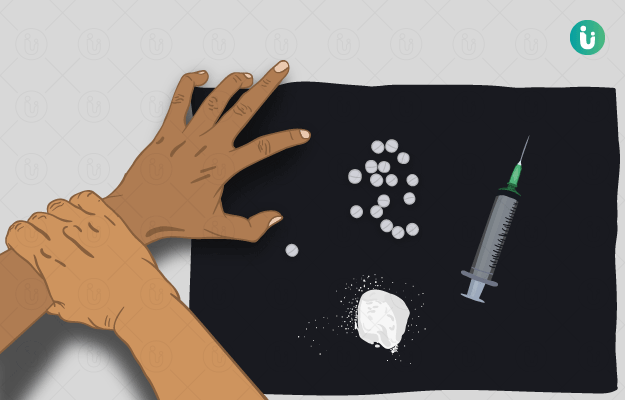What is drug addiction?
Every individual’s brain and body reacts differently to the intake of drugs. Anyone who consumes drugs may not get addicted immediately, but continuous long-term use of drugs can certainly substantially increase an individual’s risk of developing drug addiction.
An addiction to drugs can be categorised as a brain disorder, wherein the individual feels utterly dependent on the drugs and believes that he/she will be unable to function without it. This very addiction may push the individual into taking drastic steps to obtain and intake the particular drug in increasing dosage to achieve the desired effect.
What are its main signs and symptoms?
Some signs and symptoms of addiction are listed below. Parents and friends of the individual must also be aware of these signs in order to extend help to the person developing an addiction as early as possible.
These signs are:
- Social withdrawal.
- Reduced appetite
- Reduced interest in daily life activities.
- Withdrawal from hobbies.
- Unexplained loss of finances due to a frequent purchase of drugs.
- Neglecting and avoiding family members, friends, and hospital visits.
- Experiencing unexplained irritability.
- Unexplained weight loss.
- Displaying odd and erratic behaviour.
- Mental numbness and reduced emotional response.
Troubled by obesity? Failed to lose weight? Now control weight easily by myUpchar Ayurveda Medarodha Weight Control Tablet. Get started today and take steps towards a healthy life.
What are the main causes?
Understanding the causes of drug addiction requires a broader perspective on this social health issue.
- Psychological causes, such as prolonged stress and distressing environment may push an individual to try drugs for mental numbness.
- Peer pressure remains a dominant cause of drug addiction in adolescents.
- Societal stressors, such as lack of parental guidance, physical and sexual abuse, or early exposure to drugs also increase the likelihood of abusing drugs.
- Researchers have also pointed out that some individuals may be genetically predisposed to developing an addiction.
- It is also important to understand that the intake of different drugs produces different effects and the cause of addiction may be explained differently by each addict.
How is it diagnosed and treated?
Most drug addicts reveal the drugs they have been consuming upon receiving help. Hence, the diagnosis becomes easier. However, if the individual is unable to provide details, the doctor may conduct blood tests to detect the presence of drugs in the blood.
The treatment for drug addiction follows a multi-dimensional approach. A huge part of overcoming drug addiction is receiving psychological help and support from the family and peers.
Along with the use of medications, the doctor will also enrol the individual in a rehabilitation program. Medication can be combined with therapy sessions to prevent relapse.
A severe case of drug addiction may require hospitalisation.

 Doctors for Drug Addiction
Doctors for Drug Addiction  OTC Medicines for Drug Addiction
OTC Medicines for Drug Addiction
 Drug Addiction articles
Drug Addiction articles








 Editorial Team
Editorial Team











